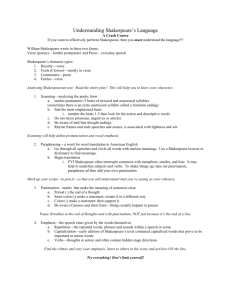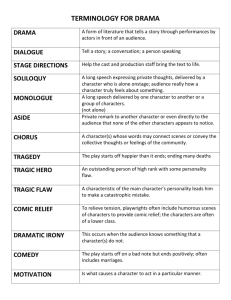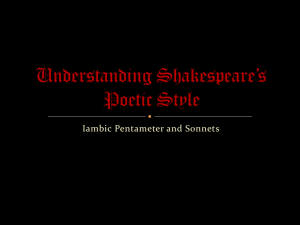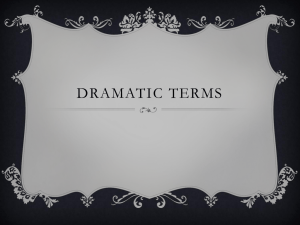Shakespeare's Language: Iambic Pentameter & Paraphrasing
advertisement
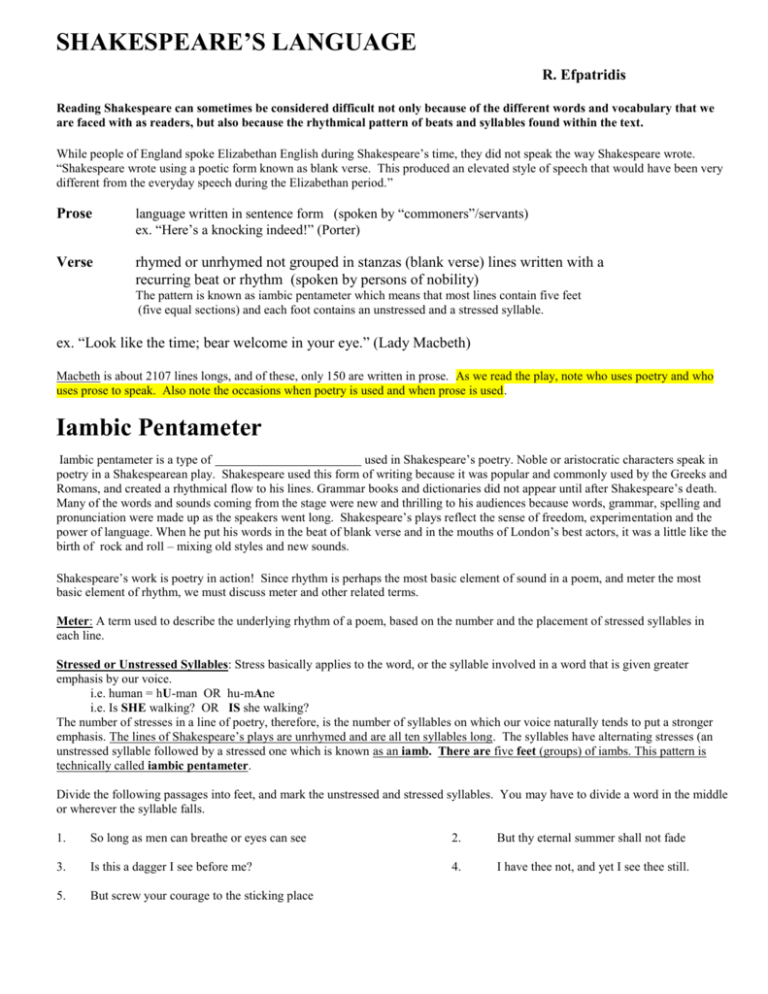
SHAKESPEARE’S LANGUAGE R. Efpatridis Reading Shakespeare can sometimes be considered difficult not only because of the different words and vocabulary that we are faced with as readers, but also because the rhythmical pattern of beats and syllables found within the text. While people of England spoke Elizabethan English during Shakespeare’s time, they did not speak the way Shakespeare wrote. “Shakespeare wrote using a poetic form known as blank verse. This produced an elevated style of speech that would have been very different from the everyday speech during the Elizabethan period.” Prose language written in sentence form (spoken by “commoners”/servants) ex. “Here’s a knocking indeed!” (Porter) Verse rhymed or unrhymed not grouped in stanzas (blank verse) lines written with a recurring beat or rhythm (spoken by persons of nobility) The pattern is known as iambic pentameter which means that most lines contain five feet (five equal sections) and each foot contains an unstressed and a stressed syllable. ex. “Look like the time; bear welcome in your eye.” (Lady Macbeth) Macbeth is about 2107 lines longs, and of these, only 150 are written in prose. As we read the play, note who uses poetry and who uses prose to speak. Also note the occasions when poetry is used and when prose is used. Iambic Pentameter Iambic pentameter is a type of used in Shakespeare’s poetry. Noble or aristocratic characters speak in poetry in a Shakespearean play. Shakespeare used this form of writing because it was popular and commonly used by the Greeks and Romans, and created a rhythmical flow to his lines. Grammar books and dictionaries did not appear until after Shakespeare’s death. Many of the words and sounds coming from the stage were new and thrilling to his audiences because words, grammar, spelling and pronunciation were made up as the speakers went long. Shakespeare’s plays reflect the sense of freedom, experimentation and the power of language. When he put his words in the beat of blank verse and in the mouths of London’s best actors, it was a little like the birth of rock and roll – mixing old styles and new sounds. Shakespeare’s work is poetry in action! Since rhythm is perhaps the most basic element of sound in a poem, and meter the most basic element of rhythm, we must discuss meter and other related terms. Meter: A term used to describe the underlying rhythm of a poem, based on the number and the placement of stressed syllables in each line. Stressed or Unstressed Syllables: Stress basically applies to the word, or the syllable involved in a word that is given greater emphasis by our voice. i.e. human = hU-man OR hu-mAne i.e. Is SHE walking? OR IS she walking? The number of stresses in a line of poetry, therefore, is the number of syllables on which our voice naturally tends to put a stronger emphasis. The lines of Shakespeare’s plays are unrhymed and are all ten syllables long. The syllables have alternating stresses (an unstressed syllable followed by a stressed one which is known as an iamb. There are five feet (groups) of iambs. This pattern is technically called iambic pentameter. Divide the following passages into feet, and mark the unstressed and stressed syllables. You may have to divide a word in the middle or wherever the syllable falls. 1. So long as men can breathe or eyes can see 2. But thy eternal summer shall not fade 3. Is this a dagger I see before me? 4. I have thee not, and yet I see thee still. 5. But screw your courage to the sticking place Macbeth-Study Guide Mrs. Dobson-Efpatridis Paraphrasing (Translating) Shakespeare’s Language Paraphrasing Shakespeare’s words involves simplifying the language in order to clarify the meaning and to make it more accessible to the modern reader. When you paraphrase a passage you should be simple and to the point, making certain that you have not omitted information that is central to the meaning of the passage. When PARAPHRASING Shakespeare follow the steps below: 1. Read the passage several times carefully for comprehension. 2. Re-read it a second time looking up difficult words if necessary. 3. Re-phrase the passage and modernize it using your own words wherever possible. 4. Do not translate line by line but rather from sentence to sentence. Pay attention to punctuation. 5. Change as much or as little as necessary to clarify meaning without omitting main ideas or adding something that is not already there. Do try to condense where possible. 6. Finally, the passage must be grammatically correct and coherent. Sentence structure must be standard and punctuation included. Rewriting Shakespeare Rewrite the following sentence in modern colloquial (everyday) English. 1. Get thee hence, idle wench! 2. Stay but a moment longer, prithee. 3. Tis known I am a pretty piece of flesh. 4. Prithee, wouldst thou stay and sup with me in yonder chamber? 5. Farewell, I’ll see thee anon. 6. My naked weapon is out. 7. Peace, Sirrah! Dost thou tarry still? 8. Get thee to thy chamber! 9. Shall I compare thee to a summer’s day? 10. What need we fear who know it, when none can call our power to account? .
